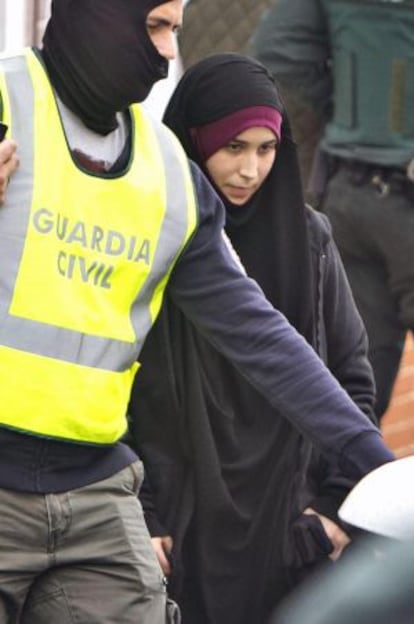From Metallica fan to demure jihadist
Young woman's express radicalization alarms police monitoring online recruiting by ISIS


Maria Ángeles didn’t have a suitor – she had three. Three combatants from Islamic State (ISIS) had been keeping her glued to her computer for months.
Locked inside her room, in her mother’s house in Almonte (Huelva), she would sit in front of the screen and morph into Maryam Al-Andalusiya (Mary of Andalusia).
The 22-year-old had secretly converted to Islam in a Seville mosque in April, and allowed herself to be seduced (in English) by the words and images of bearded men who promised her a new life “in the paradise of brothers.”
“They spoke in encrypted messages about the West’s responsibility in the Syrian conflict, and about the importance of women in the new state,” say investigators.
In the space of under a year, and without leaving her house, she stopped posting videos of Metallica, one of her favorite bands, on her social networking pages, and instead began uploading lessons on how to wear the hijab in a stylish manner.
She was wearing Islamic dress when she was arrested last week at Madrid’s Adolfo Suárez-Barajas Airport, as she was about to board a plane to Istanbul. Besides a copy of the Koran in Spanish – she’d only had time to take a few private lessons in Arabic – María Ángeles was also in possession of several addresses and telephone numbers of contacts in Turkey who would help her cross the border and join her would-be captors in the caliphate of Abu Bakr al-Baghdadi.
Her online activities had been under surveillance for nearly a year, after police observed her making “risky” contacts
This case of “express radicalization” has caused alarm among Civil Guard experts who are investigating Islamist terrorism.
“It is relatively understandable for a woman of Islamic culture to take the step toward radicalism, but a Christian girl from a normal family who knows nothing about Islamic culture... it’s like changing from a solid state to a gaseous state in record time,” said one source.
Investigators say her case illustrates how ISIS is conducting a massive campaign via social media – members have around 44,000 Twitter accounts open – to attract women to their cause and ensure that families are created in the self-professed state, which has annexed much of Iraq and Syria in just a few years.
The latest issue of Dabiq magazine, published online in several languages by ISIS, includes a message to women, whose role as wives and mothers is praised as an integral part of the Jihad.
Since 2013, 18 women have been arrested in Spain – according to the latest figures by the Real Instituto Elcano think tank – either as recruiters or recruits. Two of these had converted to Islam, including a Chilean woman who “fell in love” with a French-born mujahideen who was living in Syria.
Until 2012, no woman had been convicted of jihadist activities in Spain. Now there are 13 serving prison terms, according to High Court Judge José Luis Castro.
In the privacy of her room, Maryam al-Andalusiya was living a parallel life. And even though her family suspected nothing, her brother told police officers that he had caught her watching videos posted by terrorists.
“She’s weird lately, she’s spending a lot of time in front of the computer,” said a former student of Doñana High School who shared classes with María Ángeles in statements to the police.
Her online activities had been under surveillance for nearly a year, after police observed her making “risky” contacts.
On Monday of last week, she left her house “wearing normal clothes.” She caught a bus to Seville, then another one to Madrid. By the time she reached Barajas airport she was already wearing a full-length black robe and had a one-way ticket to Istanbul.
“It would have made no difference if she’d booked a return trip as well,” said investigators. “None have ever come back.”
English version by Susana Urra.
Tu suscripción se está usando en otro dispositivo
¿Quieres añadir otro usuario a tu suscripción?
Si continúas leyendo en este dispositivo, no se podrá leer en el otro.
FlechaTu suscripción se está usando en otro dispositivo y solo puedes acceder a EL PAÍS desde un dispositivo a la vez.
Si quieres compartir tu cuenta, cambia tu suscripción a la modalidad Premium, así podrás añadir otro usuario. Cada uno accederá con su propia cuenta de email, lo que os permitirá personalizar vuestra experiencia en EL PAÍS.
¿Tienes una suscripción de empresa? Accede aquí para contratar más cuentas.
En el caso de no saber quién está usando tu cuenta, te recomendamos cambiar tu contraseña aquí.
Si decides continuar compartiendo tu cuenta, este mensaje se mostrará en tu dispositivo y en el de la otra persona que está usando tu cuenta de forma indefinida, afectando a tu experiencia de lectura. Puedes consultar aquí los términos y condiciones de la suscripción digital.








































